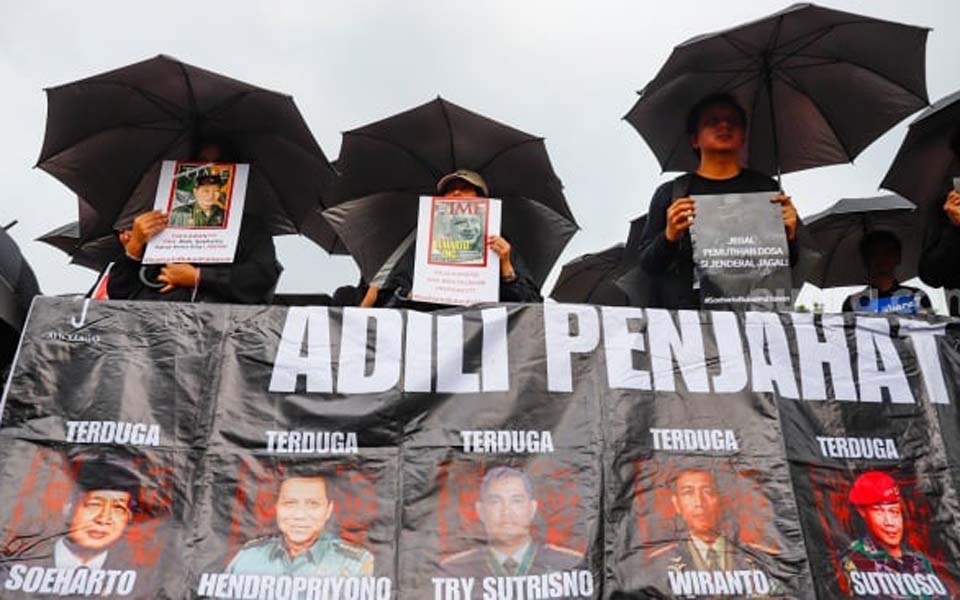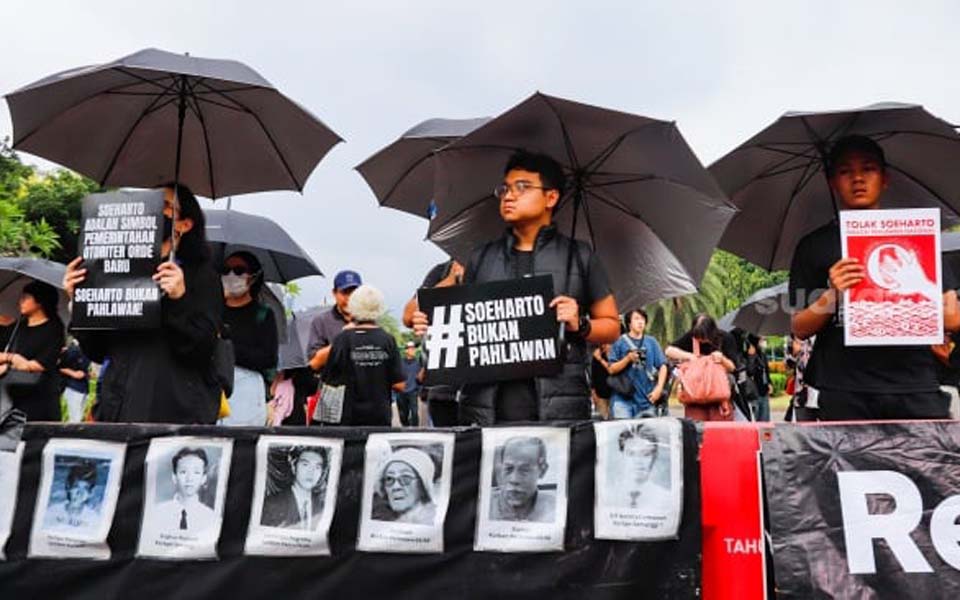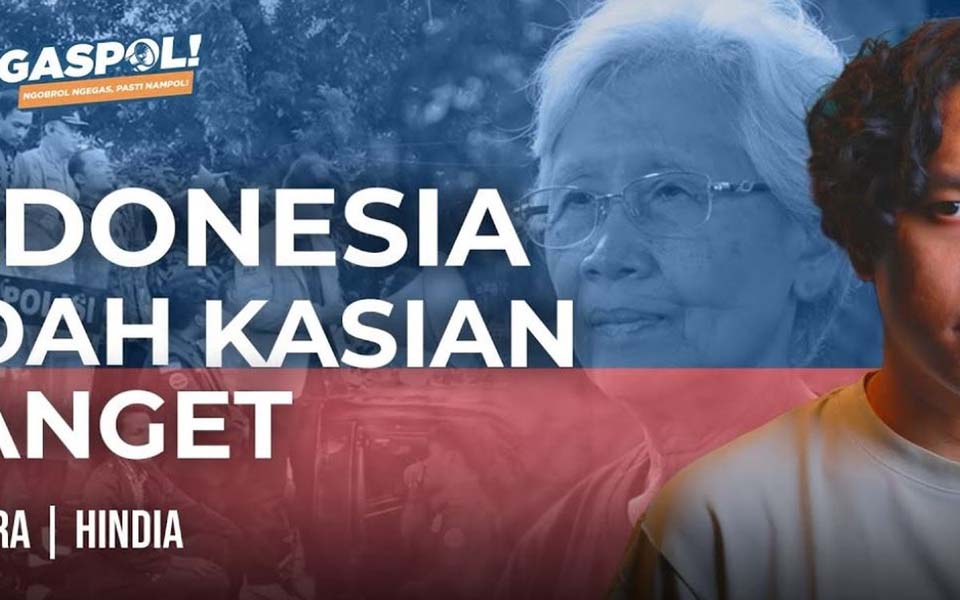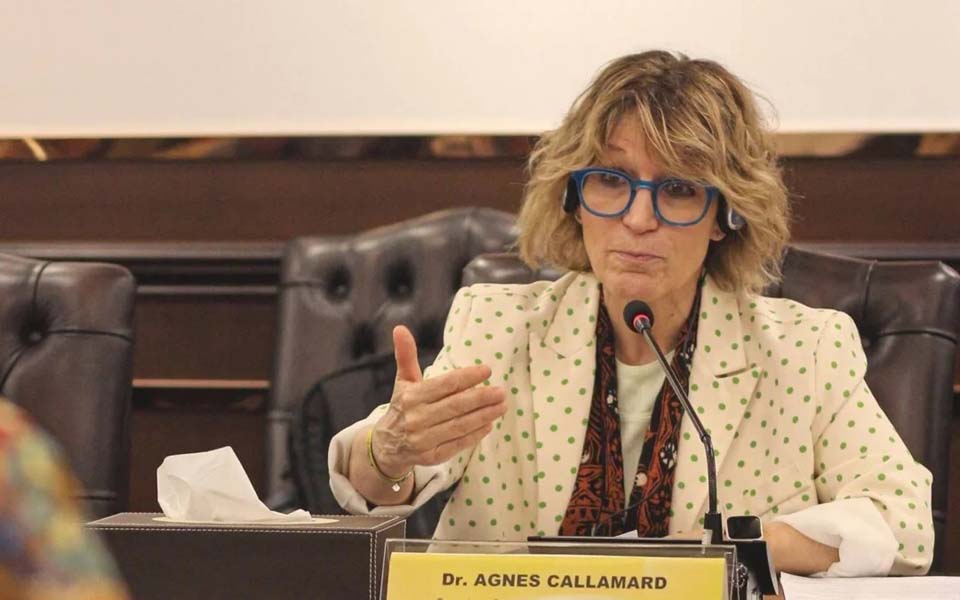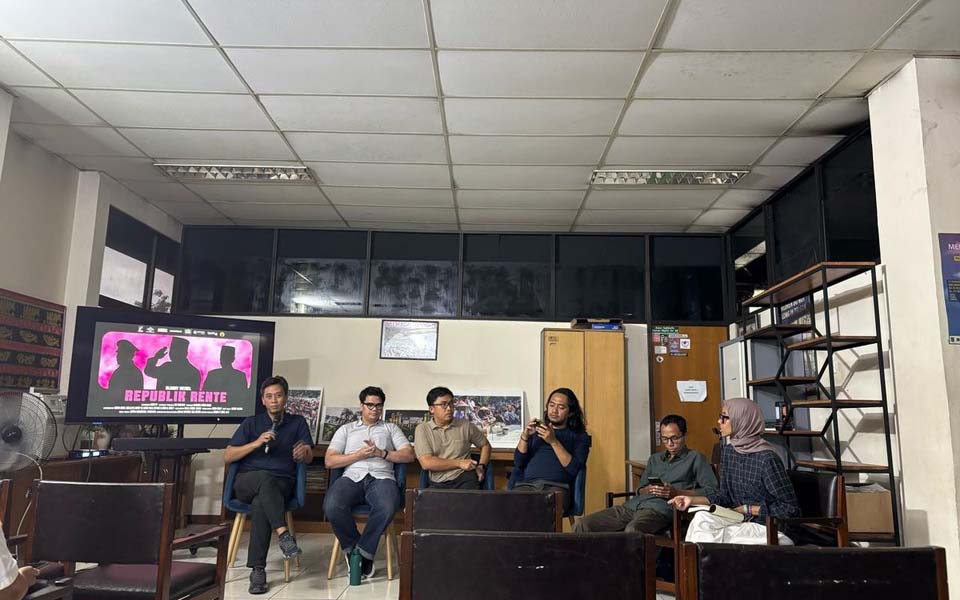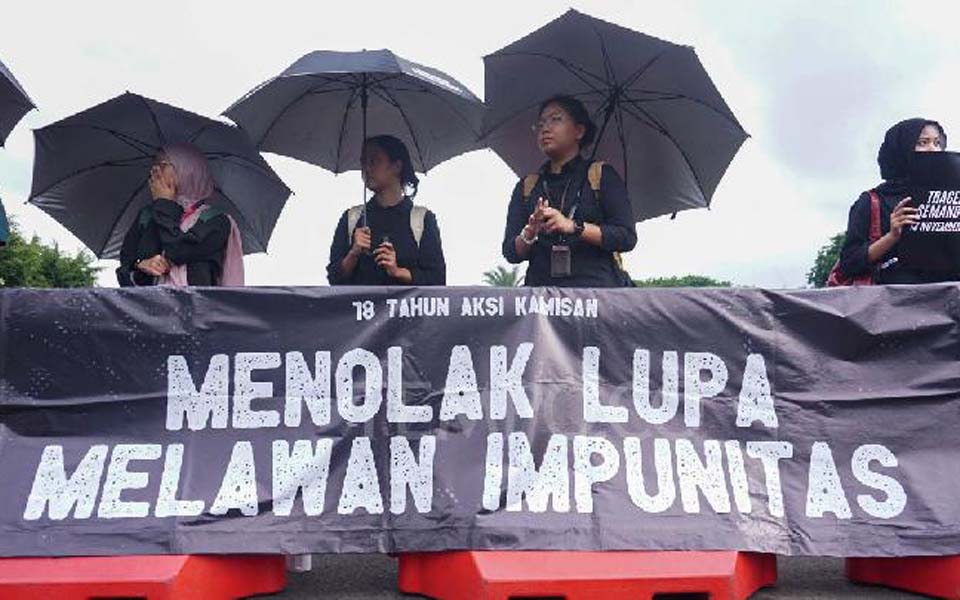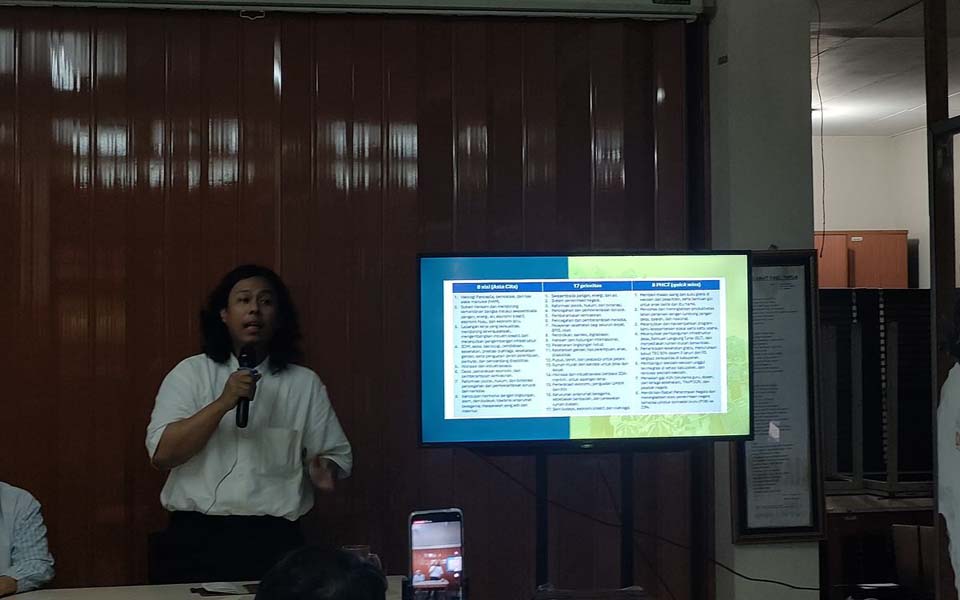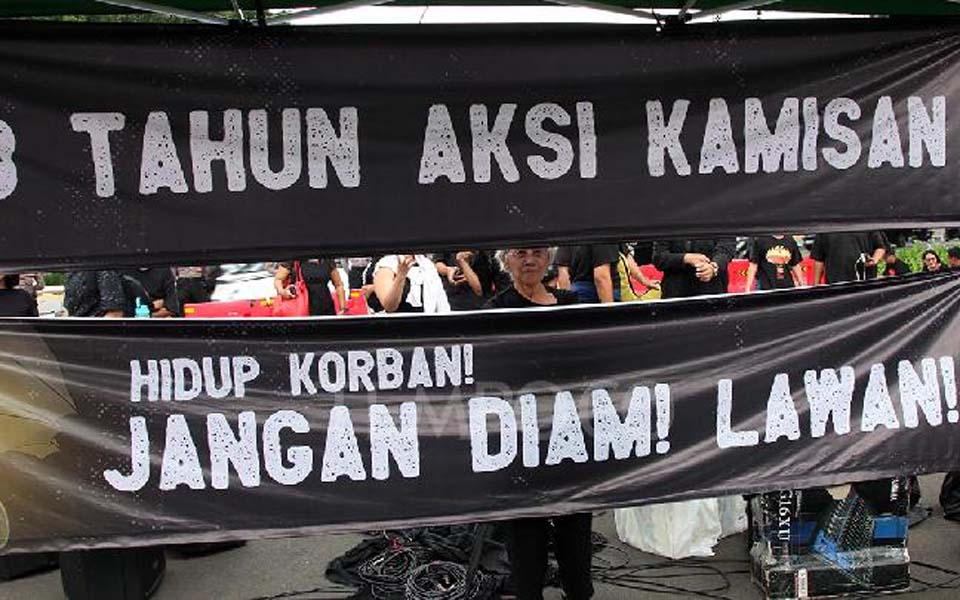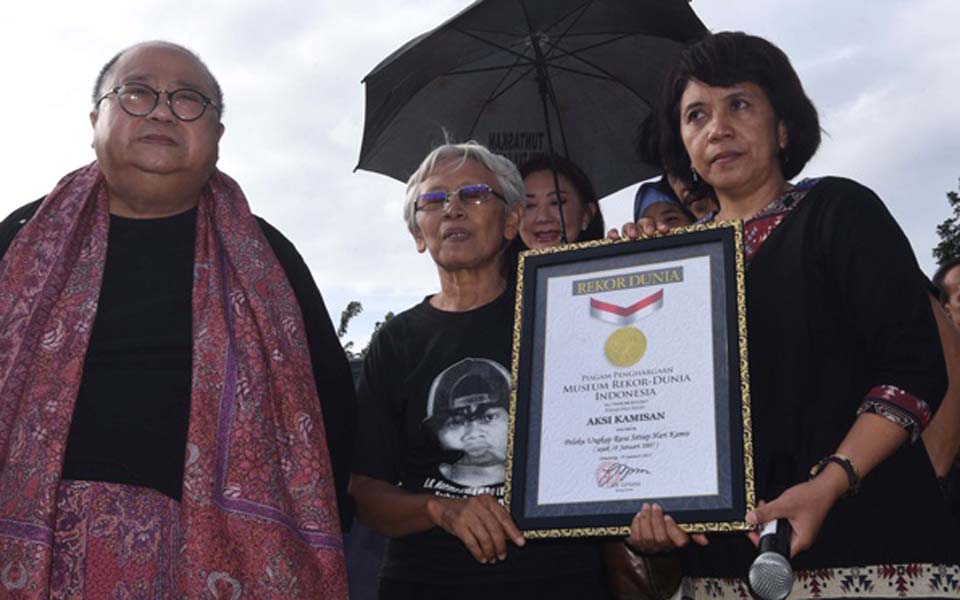Dusk had only just fallen when a black Land Cruiser entered the grounds of the national police headquarters on Jalan Trunojoyo in South Jakarta on Sunday May 29. Just a few metres from the gate the vehicle stopped. “Should we turn right Sir? To the chief of police’s office”, asked the driver. “Ah, you. No! We’re going to the public relations desk. [I’m] retired now and don’t have any business with the police chief”, said his boss.
The former general opened the car window. Two police immediately approached to pay their respects. “Can you take me to the public relations desk?” he asked. The officers nodded and ran in front of the Land Cruiser as it drove to its destination. The retired general was none other that Abdullah Makhmud Hendropriyono, the former director of the National Intelligence Agency (BIN).
That afternoon, the general was reporting Rachland Nashidik and Usman Hamid to the police, two members of the Fact Finding Team in the case of human rights activist Munir’s death. Hendropriyono believes he has been slandered by the pair and that they have damaged his reputation though statements carried in the mass media.
In the middle of preparing a dossier for police last Sunday, Hendropriyono made time to be interview by Tempo at his office on Jalan Dr. Saharjo in South Jakarta.
Why did you report the Munir Fact Finding Team (TPF) to the police?
I felt that my reputation had been blackened by telling the media that I was involved in the case. What was the evidence? They, it was said that I went to America and they are hunting for me. Hunted? That sentence hurt my feelings. While in fact I wasn’t in America. It was wrong and it was slanderous. In the beginning I thought the TPF was professional. I believed it was a legal case, so it should be solved by the police, not politically. But it has been misused. It’s agenda is unclear, it isn’t directed towards efforts to solve Munir’s death. As a result of the picture painted in the media, I was upset. It was because of this I had to respond legally so that it didn’t become a precedent.
How much as this impacted on you?
A great deal. For example when I was serving a meal to an overseas colleague. When I offered them a drink they said “Is there any arsenic in it?”. Of course it was a joke, but it was hurtful yeah. It didn’t just happen once – but twice. Then it was said I was to be questioned. This disrupted my schedule. Friends who had planned to meet me put off their plans.
Where have you been over the last few months?
In Cibubur, at my home.
Are you or are you not involved in Munir’s murder?
I don’t think I’m involved. Only God knows [the truth]. But please question me in accordance with the law and if there is an indication of a crime. This is the legal aspect, so the approach must be, yeah, legal. Why then all this hullabaloo outside of the legal [process]?
So, if you do have to be questioned, were do you want to go?
To the police, obviously! To the investigators. As a citizen, if the police summon you, you’re obliged to go.
How did you know you were involved in the case? Was there an invitation to meet with the TPF?
I just read it in the newspapers. There was no invitation. They also didn’t phone me. (Hendropriyono told a told a television station that he had received an invitation from the TPF on Tuesday evening – Editor).
If you are invited to meet with the TPF, will you go?
Hang on a moment. If you look at this kind of performance, imprudent, unprofessional, it’s not just me, anyone would thing twice about turning up. I mean, who are they anyway, acting so arbitrarily? [Okay] there was a presidential decree [authorising its formation and mandate] but why then act so arbitrary?
It all started with Pollycarpus1. Is it true he’s a member of BIN?
I’ve already checked, he’s not a member. I headed BIN for three years. Although its members are in the thousands, I know my subordinates pretty well. What’s more his name’s strange. As long as I’ve lived I’ve never heard that name. I’ve already check with BIN’s personnel section. They said they don’t have him [on their files].
What about the issue of Polly’s weapon’s serial number?
[Munir] was poisoned, what’s what’s it got to do with a weapon?
But the TPF found information about phone contacts between Polly and one of BIN’s deputies?
It’s like this, it’s a really bureaucratic office see, a public service for anyone who wants to provide information. Intelligence is information collection yeah? So, people can phone the police station, the Koramil [local military] offices, BIN. I’m not the one who receives the calls, that’s the operator’s job. So, how would I know?
Was permission given to trace BIN’s telephone number?
I explained that in my article in the Jakarta Post (carried in the Jakarta Post on May 11 under the title: “Peeling Back the Intelligence Veil in the Murder of Munir” – Editor). I explained there, providing BIN’s telephone number actually isn’t allowed for as long as we are conducting anti-terrorist operations. The number must be kept confidential. I don’t know, why then was it revealed. So everything’s wreaked. What’s the agenda behind this?
The impression is, that BIN is hindering [the investigation]...
That’s terribly wrong. Of course [I] can’t explain the whole story, because a number of things at BIN are connected to state secrets. The punishment for revealing state secrets is not only for the one who asks. The one that reveals them will get [punished] too. So, it is wrong to say that BIN hasn’t given access to the TPF. What wasn’t provided by Mr. Syamsir [Siregar, BIN’s current director] was what was confidential. Me or anyone else, if they were the head of BIN, must behave in such a way.
The TPF has raised questions about your articles in the Jakarta Post and the Straits Times. Why wasn’t this material just handed over to them?
As an ordinary person, I have the right and the freedom to write. What I write and don’t write is not the TPF’s business, that’s my right. Is that institution so super-powerful that I have to hand everything over to the TPF? Aren’t I allowed to accept an interview with Tempo? Who determines this? Hey, it should be them, but the ones looking for me. Not the other way round.
When Munir died, where were you?
At home. I found out about it when I read the morning newspaper. Initially it was said that he had a history of hepatitis. After that, I didn’t follow it anymore. In the lead up to the change in the presidency, I was busy working on all kinds of things. I only just became concerned after all the hullabaloo started connecting it with BIN. I was surprised. What’s more it started to be fermented by the TPF.
Did you meet with Munir before he died?
Yes. During an interview with Radio El Shinta, I was confronted by Munir. After that, never again. Certainly I had a desire to meet with Munir, which I conveyed when [I] met with [leading commercial and human rights lawyer and close friend of Munir] Todung Mulya Lubis. I wanted him to become a full-time lecturer at the intelligence school which I was pioneering. We needed a guest lecturer to give us additional insights. It was only then that I found out that Munir didn’t have masters degree. In the end I didn’t invite him. The requirement for teaching at the school is having a masters degree.
(Speaking to Tempo Lubis has acknowledged the meeting. He met Hendropriyono when he was working as the director of the International Crisis Group (IGC) in Indonesia and discussed the future of a colleague, Sydney Jones, who was to be deported. He said that there was a discussion over the issue of a guest lecturer at the intelligence school. Lubis was offered a teaching position. Munir was also discussed at the meeting. However as Lubis recalls it, Hendropriyono was interested in meeting with Munir on a different matter, on his views about the draft law on intelligence.)
What were your considerations in offering Munir a job as a guest lecturer?
Lot’s [of people] were invited. Munir was just one of them. Actually I was concerned about his thoughts on human rights issues. Human rights can be interpreted in different ways yeah. Different views need to be welcomed. At Lemhannas [the National Defense Institute], those who think differently are also welcomed.
Is it true that Munir’s death was linked with the 2004 general elections?
The theory is, there was an order for BIN to get rid of Munir, who was anti-military, with the intention of discrediting [then presidential candidate Susilo Bambang] Yudhoyono as a candidate from the military. Hey, it’s absolutely untrue. As far as I know, during the presidential campaign, Munir was pro-[incumbent President] Mega[wati Sukarnoputri]. And Mrs. Mega couldn’t possible be his enemy. Rather, if [I’m] not mistaken, it was Mas Tauiq (Taufiq Kiemas, Megawati’s husband – Editor.) who carried Munir’s coffin [at his funeral].
BIN has always taken a harsh position on those who are considered to be enemies of the state. Was Munir included in the category of an enemy of the state
No! Munir didn’t show up on our radar screen. Enemies of the state are those that endanger the people yeah, pose a threat to the government and its territorial integrity.
Even though he was critical of intelligence agencies?
A critic doesn’t necessarily mean an enemy. People who criticize are different form those who commit a betrayal. There was no political benefit whatsoever in killing Munir. I don’t have a beef with him, not as an individual either. I’m not the type of person who likes someone just because the agree with or support me. I like people who criticise me, who make an argument.
Have you been able to contact Muchdi and Nurhadi2 over the issue of the TPF summons?
I only read about it in the newspapers. I also met them at BIN’s anniversary, on May 7. But [we] weren’t able to speak for long. I’m worried, if I ask all kinds of questions, it won’t be good later. Perhaps they would also be stressed out if there were summoned like that.
Are you certain Muchdi didn’t authorise an operation to murder Munir?
It is hard for me to believe that Muchdi would carry out such an operation. Muchdi is a religious person and important in the pesantrens [traditional Islamic boarding schools]. He also has a lot of experience and is professional.
Biodata:
Born in Yogyakarta on May 7, 1945
Education:
National Military Academy, Magelang (1967)
Australian Intelligence Course, Woodside (1971)
United States Army General Staff College, Fort Leavenworth, USA (1980)
Degree in State Administration STIA LAN RI, Jakarta (1985)
Law Degree Military College of Law, Jakarta
ABRI (Armed Forces) Military Staff and Command School (1989)
Economics Degree Open University, Jakarta (1995)
Degree in Industrial Technology, Achmad Yani University, Bandung
Post Graduate Degree in Commercial Administration, University of the City of Manila, Philippines
Carrier:
Intelligence Assistant Regional Military Command (Kodam Jaya) (1985)
Military Commander Danrem 043 Garuda Hitam (1987) in Lampung
Director A Strategic Intelligence Agency (1990)
Jakarta Military Commander (1993)
Commander of the army’s Military Education and Training Command in Bandung (1994)
Secretary Operational Development Control (1996)
Minister of Transmigration and Resettlement (1997)
Director of State Intelligence Agency (2001-2004)
Notes:
1. Pollycarpus – Garuda Airlines pilot Pollycarpus Budihari Priyanto, the prime suspect in Munir’s murder on a Garuda flight to Amsterdam on September 7, 2003. Priyanto has claimed repeatedly that he was recruited by BIN in 2002.
2. Major General Muchdi Purwopranjono was replaced as the deputy director of BIN in early August. He is also the former head of the Army Special Forces, Kopassus, a post he was removed from following an investigation into the 1998 kidnapping and torture of pro-democracy activists, 13 of whom are still missing believed dead. Nurhadi Djazuli, BIN’s former chief secretary, has been summoned for questioning on a number of occasions by the TPF but like Purwopranjono, has so far failed to appear.
[Translated by James Balowski.]






